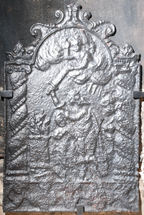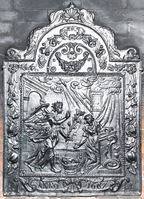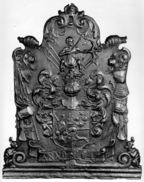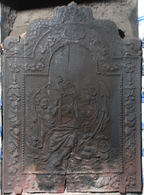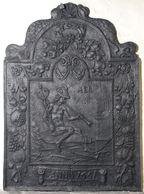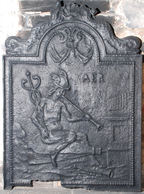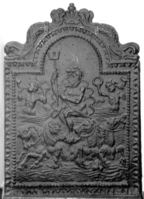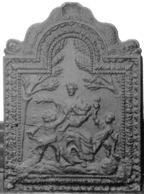-
1001
Description: Arched rectangular panel with a Salomonic column on each side enclosing a scene of Abraham about to sacrifice Isaac but being restrained by an angel; below, bottom panel of indeterminate decoration (due to corrosion); above each column a burning torch, with symmetrical floriate scrolls over the arch.
Notes: Given the biblical subject, this is probably of German manufacture although the Salomonic columns are more often encountered on English pastiches of the 'Dutch' style.
- Decoration tags:
- 'Dutch' (shape)
- fillet (edging)
- whole carved pattern
- pictorial
- biblical
- architectural
- humans
- objects
Manufactured: in the late-17th to early-18th century possibly in the Siegerland area of Germany.
Current location: Ashmolean Museum Broadway, 65 High Street, Broadway, Worcestershire, England.
(part of the Ashmolean Museum museum group)
- Attached to series:
- Old Testament & Apocrypha firebacks
- 'Dutch' Miscellaneous Firebacks
-
21
Description: Rectangular central panel with bead edging all round, pictorial representation of the Annunciation by the Angel Gabriel to the Virgin Mary, the angel carries a lily, Mary kneels at a desk, between them is a basket, above them a dove descends from clouds amid sunbeams, to the left is an arch, in the centre a bed, and to the right a window and a canopy; above the panel is a bead-edged arch with a central scallop shell and a floral swag suspended from scrolls; arched rectangular shaped border with fillet edging, a cascade of leaves and fruit (inc. apples, grapes, pears and pomegranates) descending from a wreath, at the base two cartouches conjoined by a scallop shell and containing the inscription; on top a scallop shell between two dolphins.
Notes: A common fireback design originating in the Siegerland of north Germany and made for the Dutch market. A good clear casting. The illustration is copied from Virgil Solis, 'Biblische Figuren',1562.
Copies of this fireback are known.
Inscription: ANNO 1667
Manufactured: in 1667 in the Siegerland area of Germany.
Current location: Bateman's, Burwash, East Sussex, England.
Museum number: 761056 (part of the National Trust museum group)
Citation: Herskamp, W, 2007, Die Eiserne Bibel (Helios, Aachen).
- Attached to series:
- 'Dutch' Miscellaneous Firebacks
- New Testament firebacks
-
1030
Description: Quasi-arched rectangular shape upon a moulded plinth; on a background comprising foliate swirls, a central shield, helm, coronet and elaborate mantling, with a crest of a forward facing centaur armed with a drawn bow pointed to the sinister side, and behind which are six pennons, three each side display in a v-shape; to the left, a triumph comprising a drum, draped flag on pole, concealing an arquebus, halberd and breastplate, and a broad-brimmed hat with feather; to the right, a triumph comprising a drum, a breast plate and tassets, a powder horn, and partially concealed arquebus, sword and spear, and a broad-brimmed hat with feather; at the base, a horizontal fillet with scrolled ends and squatting 'rodents'.
Notes: An uncharacteristic fireback designed and cast for the family of Joan Huydecoper (1625-1704). A variant without the base plinth and 'rodents' is in the collection of Museum Rotterdam (inv. 15224).
Inscription: ANNO 1647
Arms: Joan Huydecoper
- Decoration tags:
- rectangular with ornate arch (shape)
- complex individual (edging)
- whole carved pattern
- heraldic
- armorial
- text
- humans
- objects
Manufactured: in 1647 possibly in the Siegerland area of Germany.
Current location: Rijksmuseum, Museumstraat, Amsterdam South, North Holland, Netherlands.
Museum number: BK-1978-19 (part of the Rijksmuseum museum group)
- Attached to series:
- 'Dutch' Miscellaneous Firebacks
- Foreign armorial firebacks
-
1026
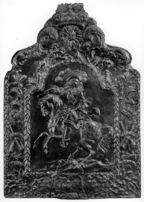 ? x ? mm
? x ? mmDescription: Arched rectangular central panel with overlapping leaf bud edging; prancing equestrian figure of a man in late-seventeenth century dress, with a plumed tricorn hat, his head turned to his left, his left hand holding the reins and his right hand pointing a baton beside the horse's head; quasi-arched rectangular border with overlapping leaf bud edging enclosing martial emblems (cannon, helmets etc.) to left and right, and surmounted by two reclining female figures, that to the left blowing a hunting horn, and that to the right supporting a cornucopia; between them, a sun in splendour, above which is a royal crown; at the bottom corrosion through use and damage has rendered the decoration indistinct.
Notes: The sun in splendour suggests that the figure is that of Louis XIV, of France, but the 'Dutch' style makes this less likely; an alternative identification might be Crown Prince Frederick (later King Frederick IV) of Denmark, of whom other fireback representations exist in a similar pose and with similar martial accoutriments.
- Decoration tags:
- 'Dutch' (shape)
- overlapping leaf bud (edging)
- whole carved pattern
- pictorial
- royal
- animals
- humans
- objects
Manufactured: in the late-17th century in Germany.
Current location:, not known.
- Attached to series:
- 'Dutch' Miscellaneous Firebacks
-
42
Description: Arched rectangular shaped central panel with bead edging; pictorial scene of a seated female figure resting against a hurdle, holding an anchor, a child on each side of her, the one on the left standing clutching corn stalks, the one on the right sitting also holding the anchor and a circular object; a bird sits on a post; arched rectangular shaped border with fillet edging, containing floral swags suspended from a wreath; on top, a scallop shell between two dolphins.
Notes: The figure represents Hope. The theft in 1699 from a Thames-side warehouse of several firebacks, including '3 of Hope with an Anchor' may refer to this type (Post Boy 11-14 Nov. 1699).
Copies of this fireback are known.
- Decoration tags:
- 'Dutch' (shape)
- fillet (edging)
- whole carved pattern
- pictorial
- allegorical
- animals
- humans
- objects
Manufactured: in the mid- to late-17th century in the Siegerland area of Germany.
Current location: in private hands, Cuckfield, West Sussex, England.
- Attached to series:
- 'Dutch' Miscellaneous Firebacks
- Hope firebacks
-
97
Description: Arched rectangular shaped central panel with bead edging; naked figure of Mercury/Hermes with winged helmet (petasos), holding a snake-entwined staff (caduceus); he is sitting astride a pair of bellows and blowing a straight trumpet; a twice-bent trumpet lies at his feet; the bellows are pumping air into an organ; to the right of his head is the word, AER (air - Latin); above is a swag of drapery; arched rectangular shaped border with ovolo edging; floral wreath at top with suspended swags of fruit and leaves, including, grapes, pomegranates and apples; inscription, ‘ANNO 1661’, on a scroll at the bottom; scallop shell and sea serpents on top.
Notes: One of a series of firebacks symbolising the four elements.
Copies of this fireback are known.
Inscription: AER / ANNO 1667
- Decoration tags:
- 'Dutch' (shape)
- ovolo (edging)
- whole carved pattern
- mythological
- allegorical
- text
- humans
- objects
Manufactured: in 1667 possibly in the Siegerland area of Germany.
Current location: Nymans, Staplefield Road, Handcross, Slaugham, West Sussex, England.
Museum number: 1206008 (part of the National Trust museum group)
- Attached to series:
- 'Dutch' Miscellaneous Firebacks
- Elements firebacks
-
98
Description: Arched rectangular shaped central panel with bead edging; naked figure of Mercury/Hermes with winged helmet (petasos), holding a snake-entwined staff (caduceus); he is sitting astride a pair of bellows and blowing a straight trumpet; a twice-bent trumpet lies at his feet; the bellows are pumping air into an organ; to the right of his head is the word, AER (air - Latin); above is a swag of drapery; outside the panel is a narrow border of the same shape with fillet edging; the fireback is surmounted by a scallop shell between two outward-facing sea serpents.
Notes: One of a series of firebacks symbolising the four elements.
Copies of this fireback are known.
Inscription: AER
- Decoration tags:
- 'Dutch' (shape)
- fillet (edging)
- whole carved pattern
- mythological
- allegorical
- text
- humans
- objects
Manufactured: in the mid- to late-17th century in England.
Current location: Nymans, Staplefield Road, Handcross, Slaugham, West Sussex, England.
Museum number: 1206021 (part of the National Trust museum group)
- Attached to series:
- 'Dutch' Miscellaneous Firebacks
- Elements firebacks
-
104
Description: 'Dutch' style; arched rectangular shaped central panel with arch at top; bead edging; female figure with staff and fan in a garden, inscription DER MITAG below figure ; similarly shaped border of Corinthian columns and floral decoration; symmetrical serpents on top.
Notes: The inscription means NOON; identified from a clearer version in the collection of the Haardplatenmuseum, Klarenbeek, Netherlands. The representations in human form of various virtues and vices in Iconologia, by Cesare Ripa, first published in the early 17th century but republished in different editions many times subsequently, formed the basis of the subject matter of several firebacks, mostly cast from continental originals, that became popular in England from the late 17th century.
Copies of this fireback are known.
Inscription: DER MITAG
- Decoration tags:
- 'Dutch' (shape)
- fillet (edging)
- whole carved pattern
- pictorial
- allegorical
- text
- humans
Manufactured: in the mid- to late-17th century possibly in the Siegerland area of Germany.
Current location: Haslemere Educational Museum, Haslemere, Surrey, England.
(part of the Haslemere Educational Museum museum group)
- Attached to series:
- 'Dutch' Miscellaneous Firebacks
-
110
Description: Arched rectangular shaped central panel with fillet and bead edging, Neptune/Poseidon, holding a trident in his right hand, sitting in a scallop shell drawn by four mythical sea horses, behind are two mermaids; arched rectangular shaped border with ovolo egg and dart edging; above, two symmetrical dolphins with a clam shell between.
Notes: Typical type of firebacks produced in Germany for the Dutch market; the central panel was made separately for insertion into different borders; this border is a relatively simple type. Formerly part of the Ade Collection (from Grove Hill, Hellingly, Sussex).
Copies of this fireback are known.
- Decoration tags:
- 'Dutch' (shape)
- ovolo, egg and dart (edging)
- carved pattern panels
- mythological
- animals
- humans
Manufactured: in the mid- to late-17th century possibly in the Siegerland area of Germany.
Current location: Hastings Museum and Art Gallery, John's Place, Bohemia Road, Hastings, East Sussex, England.
Museum number: HASMG: 1952.51.36 (part of the Hastings Museum museum group)
Citation: Lloyd, N., 1925, 'Domestic Ironwork I', Architectural Review, 58, pp. 58-67.
- Attached to series:
- 'Dutch' Miscellaneous Firebacks
- 'Dutch' Dolphin series
-
138
Description: 'Dutch' style; arched rectangular shaped central panel with bead edging, figure of Charity holding a baby in her left arm and an olive branch in her right, two other children stand on each side of her, one holding a burning heart, trees in the background; arched rectangular shaped border with fillet edging and a repeated leaf pattern; on top a clam shell between two symmetrical serpents.
Notes: Typical type of fireback produced in Germany by Dutch pattern makers; the central panel was made separately for insertion into different borders; this border is a relatively simple type; the portrayal of Charity is derived from the 'Iconologia' of Cesare Ripa. Formerly part of the Ade Collection (from Grove Hill, Hellingly, Sussex).
Copies of this fireback are known.
- Decoration tags:
- 'Dutch' (shape)
- fillet (edging)
- carved pattern panels
- allegorical
- humans
- plants
Manufactured: in the mid- to late-17th century possibly in the Siegerland area of Germany.
Current location: Hastings Museum and Art Gallery, John's Place, Bohemia Road, Hastings, East Sussex, England.
Museum number: HASMG: 1952.51.40 (part of the Hastings Museum museum group)
Citation: Lloyd, N., 1925, 'Domestic Ironwork I', Architectural Review, 58, pp. 58-67.
- Attached to series:
- 'Dutch' Miscellaneous Firebacks
- Charity firebacks
